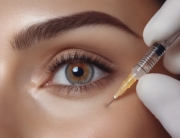It’s no surprise that there’s a lot of hype regarding hyaluronic acids in the beauty, skincare and anti-aging realms, especially in the last couple of years. Boutique skin care lines are launching hyaluronic acid marketed products, claiming they offer the same results as hyaluronic acid dermal fillers. In this article we’ll be discussing exactly what hyaluronic acids are, and how to reap the most benefits from this anti-aging powerhouse ingredient.
Hyaluronic acids are best described as humectants—meaning they maintain a strong ability to attract and hold on to water. They can retain water at least hundreds, if not thousands of times the hyaluronic acid’s own weight! That’s remarkable. Hyaluronic acid is also naturally present in our skin and connective tissue.
As toddlers and children, we naturally carry more collagen, elastin and hyaluronic acid in our bodies. These elements are responsible for giving us the healthy, youthful, vital appearance we carry as young children and teenagers. As we age, our bodies begin to produce collagen and elastin at much slower rates, eventually leading to sagging, drooping skin and hallow patches that convey a more elderly appearance.
Here’s where hyaluronic acids come into play. Have you ever heard of dermal fillers? Well the majority of them are made of different concentrations of hyaluronic acids that help restore volume and hydration to the face, while also encouraging the body to produce more collagen. Hyaluronic acids’ ability to retain moisture while mimicking our skin’s own natural ability to produce collagen, elastin and hyaluronic acid, means that the patient not only looks rejuvenated and years younger, but that they also face little to no chance of rejection as hyaluronic acids are already present in our own bodies.
You’re probably wondering, “well why can’t I use a topical hyaluronic acid product to restore volume?” First, many skincare companies have jumped onto hyaluronic acid as a new fad, creating hyaluronic acid products without the science or engineering to create a product that functions optimally for their customers. Most hyaluronic acid products list hyaluronic acid as one of the last ingredients. As well, topical hyaluronic acid does not have the ability to penetrate deep into the dermis to positively affect the skin, and to the degree that hyaluronic acid dermal fillers can immediately, and for longer sustained periods of time. Some medical-grade hyaluronic acid skin care products are well-crafted with the appropriate combination of hyaluronic acid and sodium hyaluronate to benefit the skin, but even then, topical solutions are not able to penetrate to the dermis and provide the amount of volume and hydration that a hyaluronic acid dermal filler could.
There are many different brands of hyaluronic acid dermal fillers and each carry their own combination and concentration, proving more beneficial in one facial area over the other. Some hyaluronic acid dermal fillers are thicker and longer lasting, proving more appropriate around the cheeks, while others carry a thinner, more water-like consistency—great for around the eyes and tear troughs. Some hyaluronic acid dermal fillers are more malleable, while others show more firm characteristics. It’s also great to note that hyaluronic acid dermal fillers are reversible and require no downtime.
Speak with your trusted board-certified cosmetic surgeon like Elements Spa’s Dr. Adibfar. During your consultation, you will be able to relay your concerns and desires, while Dr. Adibfar brings his knowledge, experience and aesthetic eye to address any facial imbalances and/or skin concerns. While it seems fairly simple to administer tiny amounts of hyaluronic acid filler, having a board-certified surgeon like Dr. Adibfar is favourable not only for achieving the best results due to his clear understanding of facial anatomy, but also in managing any adverse reactions should they arise. At Elements Spa, regardless of the treatment or procedure, we hold our clients’ and patients’ safety as our first priority, and we advise that all patients due diligent research when deciding who administers hyaluronic acid dermal fillers.
Click here to learn more or to book a consultation with one of Toronto’s best board-certified cosmetic plastic surgeons, Dr. Adibfar.








Leave A Comment